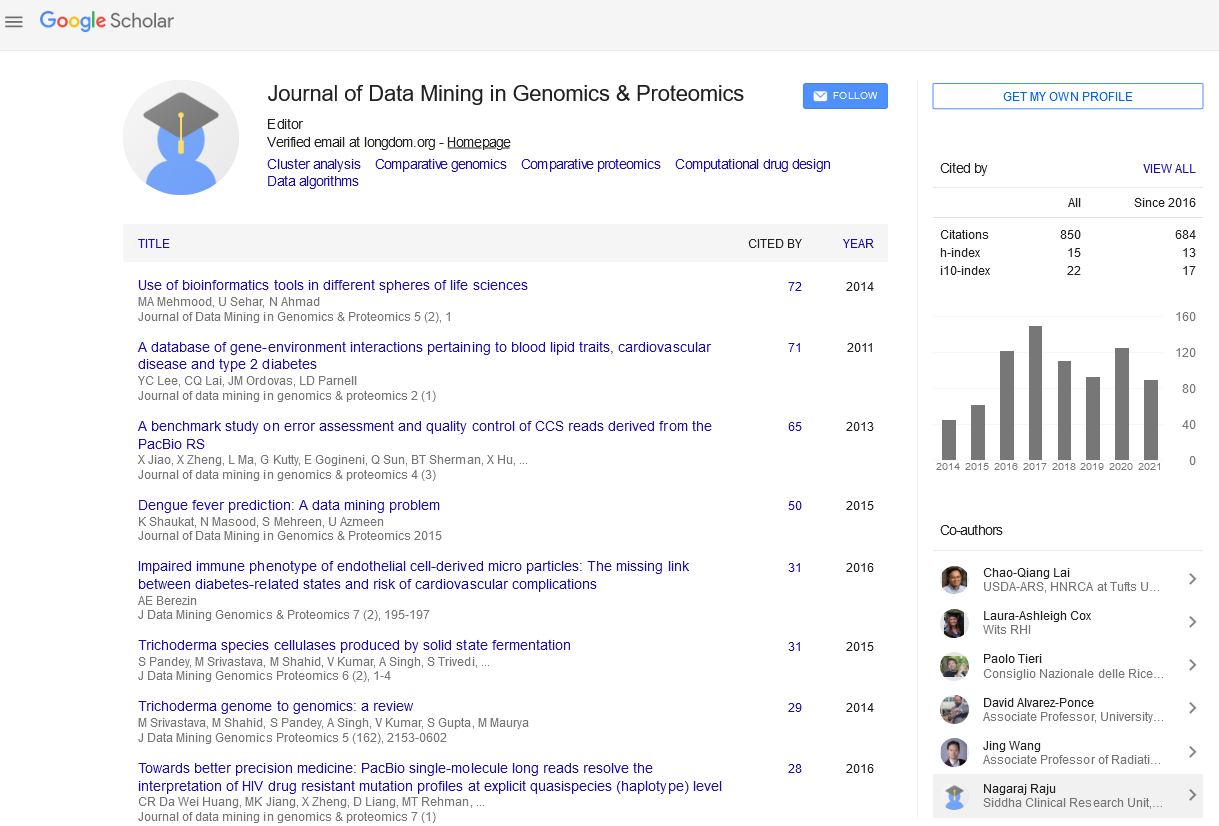PMC/PubMed Indexed Articles
Indexed In
- Academic Journals Database
- Open J Gate
- Genamics JournalSeek
- JournalTOCs
- ResearchBible
- Ulrich's Periodicals Directory
- Electronic Journals Library
- RefSeek
- Hamdard University
- EBSCO A-Z
- OCLC- WorldCat
- Scholarsteer
- SWB online catalog
- Virtual Library of Biology (vifabio)
- Publons
- MIAR
- Geneva Foundation for Medical Education and Research
- Euro Pub
- Google Scholar
Useful Links
Share This Page
Journal Flyer

Open Access Journals
- Agri and Aquaculture
- Biochemistry
- Bioinformatics & Systems Biology
- Business & Management
- Chemistry
- Clinical Sciences
- Engineering
- Food & Nutrition
- General Science
- Genetics & Molecular Biology
- Immunology & Microbiology
- Medical Sciences
- Neuroscience & Psychology
- Nursing & Health Care
- Pharmaceutical Sciences
Label-free quantitative proteomics analysis of flax (Linum usitatissimum) seed developmental stages and establishment of proteome expression profiles
Barvkar Vitthal, Varsha Pardeshi, Narendra Kadoo and Vidya Gupta
: J Data Mining in Genom Proteomics
Abstract:
BiotechnologyFlax (Linum usitatissimum L., 2n = 30) belongs to the family Linaceae and is a dual-purpose crop with utility as an oilseed (linseed) as well as stem fiber (linen). It is emerging as one of the key sources of phytochemicals in the functional food arena. It is clinically proven that consumption of flax seed reduces the risk of heart attack, inflammatory disorders, arthrosclerosis and inhibits growth of prostate and breast cancers. Flax seed is the richest agricultural source of the essential fatty acid, α-lenolenic acid (ALA) of omega-3 class and lignans along with high quality proteins, soluble fibers and phenolic compounds. Oil and lignans are important nutraceuticals that accumulate in endosperm and seed coat, respectively during seed development.In our study, high-throughput proteomics approach was employed to determine the expression profile and identity of hundreds of proteins during seed filling in flax. The proteins were analyzed at 4, 8, 12, 16, 22, 30 and 48 days after flowering using one dimensional SDS-PAGE as prefractionation method and nLC-ESI-MS/MS. Relative protein concentration was determined by spiking samples with 50 fmol of standard BSA tryptic digest. Spectral counting of standard BSA peptides was considered for relative quantification of unknown proteins. A database was developed from predicted gene models of flax whole genome sequence and raw data were searched to identify the proteins and confirmed by BLAST analysis. We identified 965 non-redundant proteins, which were classified into 14 major functional categories. The proteins involved in metabolism, protein destination and storage, metabolite transport and disease/defense were the most abundant. For each functional category, a composite expression profile has been presented to gain insight into seed physiology and the general regulation of proteins associated with each functional class. Using this approach, the metabolism-related proteins were found to decrease, while the proteins associated with destination and storage increased during seed filling.
Biography :
Mr. Vitthal Barvkar is pursuing his doctoral research at National Chemical Laboratory, Pune India under the guidance of Dr. Vidya Gupta. He has completed B.Sc. and M.Sc. Biotechnology from Vidya Pratishthan?s School of Biotechnology, Baramati, Pune. He has qualified CSIR-NET examination for Junior Research Fellowship to support his doctoral research.


